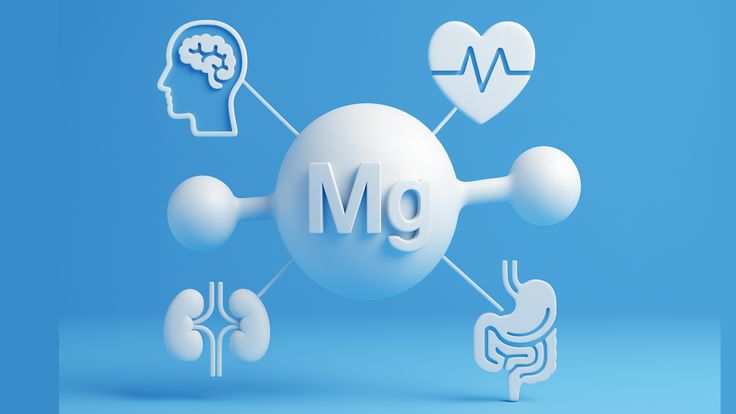Unlocking Health: Why Magnesium Is Your Secret Weapon
:max_bytes(150000):strip_icc()/Health-GettyImages-469858278-1bd3d76c34894685825ad0f05069c96b.jpg)
Magnesium, an essential mineral not naturally produced by the human body, must be obtained through diet or supplements. It plays a pivotal role in numerous bodily functions, including mineral absorption, energy production, muscle and nerve function, and DNA synthesis, contributing to a broad spectrum of potential health benefits.
Magnesium is particularly important for cardiovascular health. Acting as a vasodilator, it helps widen blood vessels, which may lower blood pressure and reduce the risk of heart disease and stroke. Its effect is generally modest, meaning individuals with hypertension may need to combine magnesium with prescribed medications.
The mineral is also linked to glucose metabolism and may help manage blood sugar levels, potentially reducing the risk of type 2 diabetes. Low magnesium levels can worsen insulin resistance, a key factor in diabetes development.
For digestive health, magnesium is a main ingredient in many laxatives, including magnesium citrate, hydroxide, oxide, and sulfate salts, which can relieve constipation. Typical doses range from 400–500 mg daily, and adequate hydration is crucial.

Magnesium supports bone health, helping to create and strengthen bones. Low levels increase the risk of osteopenia and osteoporosis, particularly in postmenopausal and older women. Supplementation can reduce the risk of fractures and bone density loss.
The mineral may also benefit neurological and mental health. Magnesium can reduce the frequency of migraines by influencing blood vessel constriction and neurotransmitters. Research suggests it may ease stress, anxiety, depression, and other conditions like ADHD, schizophrenia, and autism spectrum disorder.
Sleep quality can improve with magnesium intake, as it promotes relaxation and helps regulate the body’s circadian rhythm, potentially reducing daytime sleepiness, snoring, and nighttime awakenings.
Despite its benefits, magnesium supplementation carries risks. The recommended upper limit from supplements is 350 mg per day; exceeding this can cause diarrhea, nausea, abdominal pain, irregular heartbeat, and in severe cases, cardiac arrest. Individuals with kidney disease are particularly at risk.

Magnesium can also interact with medications. It may reduce absorption of bisphosphonates and certain antibiotics, requiring careful timing of doses. Potassium-sparing diuretics can lead to dangerously high magnesium levels, and excessive zinc intake can interfere with magnesium absorption.
In summary, magnesium is a vital mineral essential for cardiovascular, digestive, bone, neurological, and mental health. Since the body cannot produce it, maintaining adequate intake through diet or supplements is crucial for overall well-being.
Recommended Articles
Unlock Longevity: Tiny Walks Conquer 'Dead Butt Syndrome'!

New research highlights the significant health benefits of short, frequent walks for those with desk jobs, suggesting fi...
Unlocking Health: The Daily Apple's Impact on Your Body
:max_bytes(150000):strip_icc()/Health-GettyImages-2167564745-e6748455712041dca68148e125ac1642.jpg)
Apples are a nutritional powerhouse, offering a wide array of health benefits from supporting heart health and digestion...
Heart Health Revolution: Cardiologists Reveal Game-Changing Hacks

Cardiologists reveal their personal strategies for overcoming common challenges that complicate heart-healthy living. Fr...
Unveiled: Jennifer Aniston's Secret 29p Superfood for Staying in Shape!

Jennifer Aniston's diet secret, quinoa, is revealed to be a powerful superfood packed with health benefits. This gluten-...
Unveiled: The Single Best Cooking Oil for a Super Healthy Heart, Say Dietitians.
:max_bytes(150000):strip_icc()/Health-GettyImages-DietitiansAgree-HealthiestOilForYourHeart-639e5ae8a7694829829603bb123961bf.jpg)
Confused about which cooking oil is best for your heart? Experts unanimously agree that extra-virgin olive oil (EVOO) is...
You may also like...
Digital Portfolios Are the New Business Cards; Here’s How to Build One That Gets Seen

In today’s digital-first economy, your online portfolio is your handshake, résumé, and elevator pitch rolled into one. H...
Career Pivoting: Why Changing Paths Might Be the Smartest Move You Make

In a world where stability often overshadows fulfillment, career pivoting may be the smartest move for professionals se...
Why Your First Failure Might Be the Best Thing That Ever Happened to Your Business

Failure isn’t the end of entrepreneurship, it’s the education success never gives. Here’s why your first business collap...
Consumerism vs Culture: Is Africa Trading Values for Trendy Lifestyles?

Is Africa trading its cultural values for trendy lifestyles? Explore how consumerism, foreign brands, and social media p...
The War on Boys: Are African Male Being Left Behind in Gender Conversations

Why are African boys and men often left out of gender empowerment programs? Explore how emotional suppression, lack of m...
Pay Slip, Motivation Slips: The Silent Crisis Among the Working Class

Across Nigeria, millions of workers are trapped in jobs that pay just enough to survive but too little to live. Beneath ...
Premier League's Unsung Heroes: Bournemouth, Sunderland, and Tottenham Shockingly Exceed Expectations

This Premier League season sees teams like Bournemouth, Sunderland, and Tottenham exceeding expectations. Under Thomas F...
El Clasico Fury: Yamal Controversy and Refereeing Blunders Ignite Post-Match Debates
)
Real Madrid secured a 2-1 El Clasico victory over Barcelona amidst significant controversy surrounding a late penalty de...